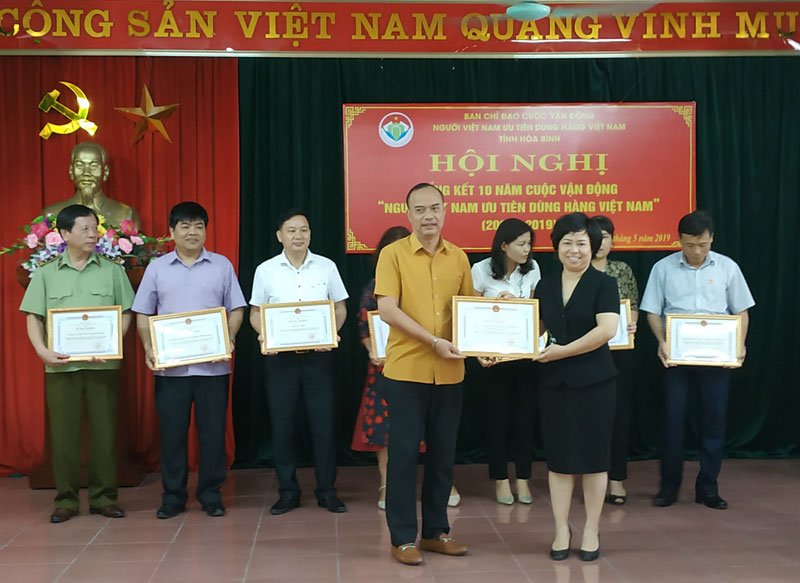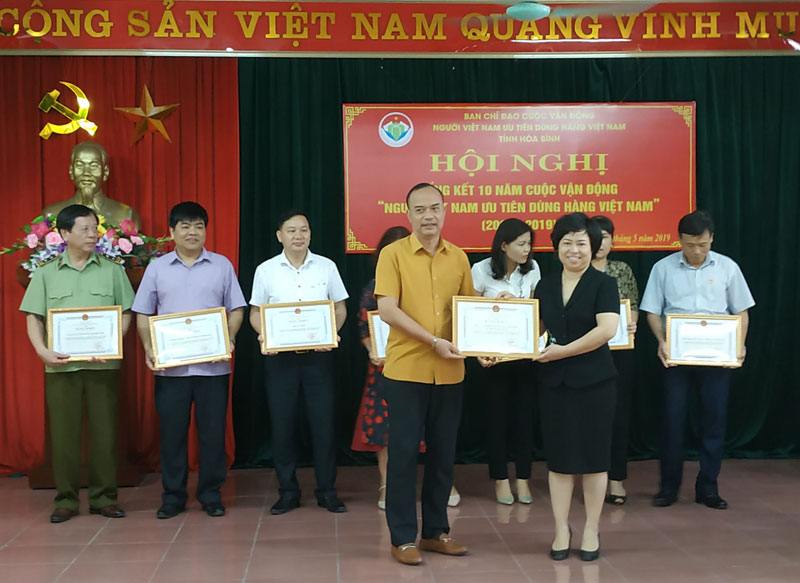
(HB0) - On May 15, the Steering Committee for the "Vietnamese people prioritise Vietnamese goods" campaign held a conference to review 10 years of the implementation of the "Vietnamese people give priority to using Vietnamese goods" campaign (2009 - 2019).
The campaign carried out by the Vietnam Fatherland Front Committee at
all levels in the province has drawn the public attention, created people’s
consensus, and received warm response of businesses, better meeting the consumption
demand of people .
 The Chairman of the Provincial Vietnam
Fatherland Front Committee presents the certificate of merit from the
Provincial People's Committee to collectives with achievements in implementing
the campaign.
The Chairman of the Provincial Vietnam
Fatherland Front Committee presents the certificate of merit from the
Provincial People's Committee to collectives with achievements in implementing
the campaign.
Programmes to bring Vietnamese goods
to rural areas, promotions, fairs and exhibitions have helped consumers in the
areas have direct access to Vietnamese brands and businesses, as well as get information
to compare, evaluate and avoid fake goods, smuggled goods and create conditions
for Vietnamese goods’ development.
During the reviewed period, 28,500 promotion programmes were organised, and 65 enterprises
were registered to launch promotions in the province with a total promotional
value of over 2 billion VND. Sectors coordinated to organise 34 market sessions
to bring Vietnamese goods to rural and remote areas in 10 districts in the
province. Of them, 18 sessions bringing Vietnamese goods to rural and remote
areas were held within the National Trade Promotion Programme in 2012. Besides,
three fixed points selling Vietnamese goods were held in Ngoc Son commune (Lac
Son district); Cao Son commune (Da Bac district); and Tu Ne commune (Tan Lac
district). The province held about nine
or ten trade fairs and exhibitions annually.
As a result, more than 400 businesses and localities in the province were assisted
to join such programmes in other provinces and cities nationwide, displaying
their products at over 800 booths. Connectivity activities also helped local
firms to introduce their products and seek markets for their goods while expanding
production. Some outstanding products joined the demand-supply chain like Muong
Dinh wine, Cao Phong orange, Tan Lac grapefruit, Kim Boi bambooshoot, herbal
tea, San Tuyet tea, and sachi seeds./.
According to data from the Hoa Binh Provincial Party Committee, the industrial production index for the first six months of 2025 is estimated to have increased by 20% compared to the same period last year. This marks the highest year-on-year growth rate for this period since 2020.
In the first six months of 2025, Hoa Binh province’s export turnover was estimated at 1.145 billion USD, marking an 18.11% increase compared to the same period in 2024. Import turnover was estimated at $ 804 million, a 17.15% increase, which helped the province maintain a positive trade balance.
The lives of the ethnic minority farmers in Tan Lac district have gradually improved thanks to the new directions in agricultural production. This is a testament to the collective strength fostered through the professional associations and groups implemented by various levels of the district’s Farmers’ Union.
With the motto the "product quality comes first,” after nearly one year of establishment and operation, Muong village’s Clean Food Agricultural and Commercial Cooperative, located in Cau Hamlet, Hung Son Commune (Kim Boi district), has launched reputable, high-quality agricultural products to the market that are well-received by consumers. The products such as Muong village’s pork sausage, salt-cured chicken, and salt-cured pork hocks have gradually carved out a place in the market and they are on the path to obtaining the OCOP certification.
In the past, the phrase "bumper harvest, rock-bottom prices" was a familiar refrain for Vietnamese farmers engaged in fragmented, small-scale agriculture. But today, a new spirit is emerging across rural areas of Hoa Binh province - one of collaboration, organisation, and collective economic models that provide a stable foundation for production.
Maintaining growing area codes and packing facility codes in accordance with regulations is a mandatory requirement for agricultural products to be eligible for export. Recently, the Department of Agriculture and Environment of Hoa Binh province has intensified technical supervision of designated farming areas and packing facilities to safeguard the "green passport" that enables its products to access international markets.



 The Chairman of the Provincial Vietnam
Fatherland Front Committee presents the certificate of merit from the
Provincial People's Committee to collectives with achievements in implementing
the campaign.
The Chairman of the Provincial Vietnam
Fatherland Front Committee presents the certificate of merit from the
Provincial People's Committee to collectives with achievements in implementing
the campaign.